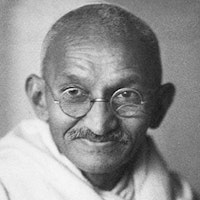For I can see that in the midst of death life persists, in the midst of untruth truth persists, in the midst of darkness light persists…
Mohandas K. Gandhi

In the Midst of Darkness
Topic: Overcoming Adversity
I do dimly perceive that whilst everything around me is ever changing, ever dying, there is underlying all that change a living power that is changeless, that holds all together, that creates, dissolves, and re-creates. That informing power or spirit is God. And since nothing else that I see merely through the senses can or will persist, He alone is.
And is this power benevolent or malevolent? I see it as purely benevolent. For I can see that in the midst of death life persists, in the midst of untruth truth persists, in the midst of darkness light persists. Hence I gather that God is Life, Truth, Light. He is Love. He is the Supreme Good.
Mohandas Karamchand Gandhi, known universally as Mahatma Gandhi, was born on October 2, 1869, in Porbandar, a small town on the western coast of India. He hailed from a Hindu merchant caste family and his father served as the chief minister of Porbandar state. Gandhi's youth was shaped by deeply spiritual influences that stemmed from his mother's devout Jainism, which instilled in him beliefs in non-violence, fasting, meditation, and vegetarianism. As a young man, Gandhi travelled to London to study law, an experience that further broadened his perspective and exposed him to Western ideas of justice and equity.
Returning to India after completing his studies, Gandhi found himself dissatisfied with the legal profession and soon moved to South Africa to work on a legal case. It was in South Africa, faced with rampant racial discrimination, that Gandhi began to refine the philosophy of non-violent resistance, or Satyagraha, a principle deeply rooted in his religious beliefs. For nearly 21 years, Gandhi strove for the civil rights of Indians in South Africa, successfully employing methods of civil disobedience and passive resistance.
In 1915, Gandhi returned to India, bringing with him his deeply entrenched ideas of Satyagraha. He assumed leadership of the Indian National Congress and led nationwide campaigns for easing poverty, expanding women's rights, ending untouchability, and achieving Swaraj, or self-rule. His role in the Indian independence movement was monumental, with his leadership and doctrines of non-violent resistance culminating in India's independence from British rule in 1947. However, his life was tragically cut short when he was assassinated on January 30, 1948. His legacy, nonetheless, continues to inspire peace movements globally, securing his place as one of the most significant figures of the 20th century.
My Religion
Gandhi, Mohandas K. “The Path” and “In the Midst of Darkness.” Young India, 1920s. Reprinted in My Religion, Navajivan, 1955.

Mohandas K. Gandhi
Theme: Adversity

About This Mohandas K. Gandhi Quotation [Citation]
Mohandas K. Gandhi’s quotation, “For I can see that in the midst of death life persists, in the midst of untruth truth persists, in the midst of darkness light persists. Hence I gather that God is Life, Truth, Light. He is Love. He is the Supreme Good,” reflects his deep belief in the enduring nature of divine qualities. Despite adversity, Gandhi sees a persistent benevolence that transcends the struggles and sufferings of life. This perspective, deeply rooted in his spiritual conviction, holds that the divine essence manifests through resilience and goodness, even in the darkest times. For Gandhi, these qualities are tangible forces that affirm God’s presence and benevolence.
In the broader context of this passage, Gandhi reflects on the ever-changing world and the constancy of a divine power that orchestrates this change. He perceives a “living power that is changeless, that holds all together,” identifying this as God. This power is the creator, sustainer, and redeemer of life. Gandhi’s insight into this eternal, benevolent force highlights his belief that despite apparent chaos and suffering, a steadfast divine presence ensures the persistence of life, truth, and light. His view encourages faith in a higher order that transcends life’s immediate adversities.
Gandhi’s identification of God with life, truth, light, and love offers a spiritual framework for overcoming adversity. He emphasizes that these divine attributes are ever-present, even in dire circumstances. This conviction provides a moral compass and strength for individuals facing challenges. By affirming that “God is Life, Truth, Light. He is Love. He is the Supreme Good,” Gandhi underscores the inherent goodness and benevolence of the divine, offering a message of hope and resilience. His words remind us that in our struggles, a persistent divine presence guides and sustains us, encouraging us to rise above adversity with faith and love.
Mahatma Gandhi [Commentary by Eknath Easwaran]
Mohandas K. Gandhi (1869-1948; Mahatma means “great soul”) was born in British India and led his country to freedom through a thirty year struggle based completely on nonviolence. His formulation of satyagraha (“holding to truth”) as a systematic method for transforming conflict into unity among individuals, communities, and nations, is one of the inspired innovations of the twentieth century. His daily guidebook was the BHAGAVAD GITA, a core scripture of Hinduism, which he translated into his life. When he fell to an assassin’s bullet in January 1948, Albert Einstein was among the millions around the world who mourned, saying, “Generations to come, it may be, will scarce believe that such a one as this ever in flesh and blood walk upon the earth.” Gandhi’s own estimation of himself was characteristically different: “I have not the slightest doubt that any man or woman can achieve what I have, if he or she would make the same effort and cultivate the same hope and faith.”
“The Path” and “In the Midst of Darkness,” from articles Gandhi wrote for his weekly paper Young India in the 1920s, are included in many collections of Gandhi’s writings, including My Religion (Ahmedabad, India: Navajivan, 1955). Gandhi read “In the Midst of Darkness” for Columbia Gramophone Company while he was in England working for India’s independence in 1931―the first and the last time his voice was preserved in a studio recording.
―Eknath Easwaran [Blue Mountain Center of Meditation]. God Makes the Rivers to Flow: an Anthology of the World’s Sacred Poetry & Prose. Nilgiri Press, 2009, p. 203 [Mahatma Gandhi, My Religion (Ahmedabad, India: Navajivan, 1955)].
Resources
Related Quotes
Copyright © 2017 – 2025 LuminaryQuotes.com About Us